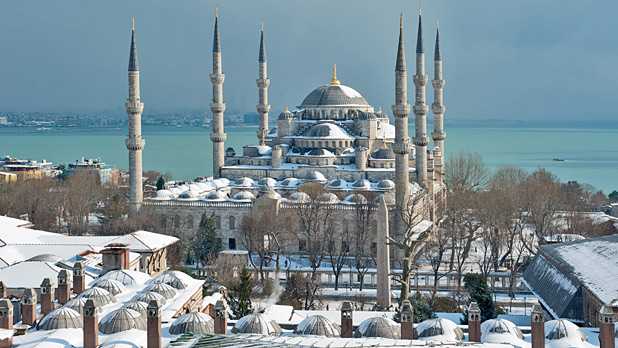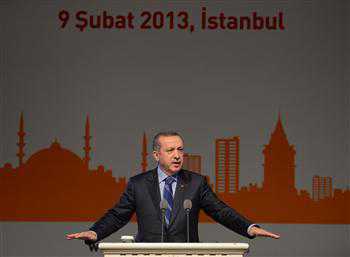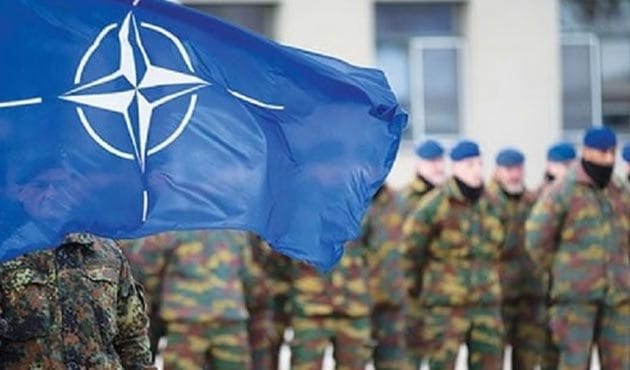Turkish Prime Minister Recep Tayyip Erdogan (C) attends a meeting at the headquarters of his ruling Justice and Development Party in Ankara in September 2011. (photo by REUTERS/Umit Bektas)
“If it is going to end the bloodshed, if it is going to stop the tears, we are ready to pay the price for it,” said Turkish Prime Minister Recep Tayyip Erdogan in Ankara on Feb.15. He was personally delivering the message at Justice and Development Party (AKP) headquarters that to find a solution to Turkey’s Kurdish issue, he intends to move ahead with the latest initiative engaging Abdullah Ocalan, the leader of the Kurdistan Workers Party (PKK) imprisoned in Imrali since 1999. Turks are confused and distrustful of the initiative, with many doubting that it will finally lead to the PKK disarming.
About This Article
Summary :
Tulin Daloglu argues that Turkey is ready for a settlement that will end PKK violence, but political posturing by the government does not help.
Author: Tulin Daloglu
Posted on : February 15 2013
|
Since 2002, Erdogan has won three consecutive elections and has posted increases in his party’s constituency each time. The AKP continues to get high marks in public opinion polls when people are asked if the party will win big in the general elections scheduled for 2015. Regardless, political lives will likely be dependent on the handling of the PKK peace process.
The Kurdish issue is a legendary and thorny problem for Turkey, and Erdogan apparently has his heart set on being the man that brings a peaceful conclusion to it. Yet the prime minister is angry at everybody under the Turkish parliament’s roof. For the moment, he declines to take on Selahattin Demirtas, chairman of the Kurdish Peace and Democracy Party (BDP), as a legislative partner although Erdogan wants, and sorely needs, the BDP’s support to make the Imrali talks a success. The prime minister refuses even to shake Demirtas’ hand because, he says, the BDP, an organic political branch of the PKK, supports violence. Yet, Erdogan exhorts, “BDP, you have to take this risk. If you are going to act according to a message that will come from Kandil [location of the PKK leadership in northern Iraq], you won’t have the right to claim, ‘I did all I could to end this bloodshed.’”
As for another opposition leader, at AKP headquarters Erdogan described Devlet Bahceli, chairman of the Nationalist Movement Party (MHP), as one who lacks “humanity” and said that he won’t “take [his opinion] into consideration.” He further offered that the “MHP leader has created an illusionist world, and he is the only one to sing and listen to himself there.”
The prime minister may well have his reasons for being frustrated with the political parties. As stated in this column on a number of occasions, rhetoric and attitude are key to shaping Turkey’s future, and they must be inclusive devices. As head of a single-party government for more than a decade, however, it has been Erdogan alone who took key decisions. During that time, the ruling party has cooperated barely a handful of times with the opposition in parliament. Making sure that all Turkish citizens are persuaded by a negotiated deal with the PKK is the only way to solve the Kurdish issue. This can only happen, however, if the opposition parties are also involved as representatives of the people who elected them.
The AKP has a responsibility first to engage and brief the opposition in parliament on how exactly it proposes to put an end to the bloodshed. Then it must win their support so these same parliamentary members can bring along their constituencies, thus helping Turks work together toward a common resolution. It is, therefore, worth questioning the seriousness of the Erdogan government’s efforts thus far in solving this issue.
People are fed up with the violence that began in 1984. No one wants to see another person fall victim, in political terms or physically, to this conflict. The AKP has the support of the majority of the people, but its attitude — especially on this issue — contains more risks than the continuance of violence. In fact, it carries the possibility of turning the situation into a Turkish-Kurdish war.
The AKP cannot make peace with Ocalan or the Kurds if it ignores the people. A public opinion survey released by MetroPoll on Feb. 14 revealed that the majority of Istanbul residents opposes the Imrali talks. The survey, conducted between January 26 and February 1, included 2,502 people. Of those, 56.1% said they do not approve of the talks, whereas 25.1% expressed approval.
When asked whether they would support Republican People’s Party chairman Kemal Kilicdaroglu if he were to accept the talks in Imrali as the right way forward, 59.6% said “no.” When the same question was asked involving Bahceli, 51.5% answered in the negative. When asked whether they favored moving Ocalan to house arrest, 83.9% objected.
Erdogan must realize how difficult such numbers make life for opposition leaders who want successful peace talks. It would be literally insane to think that anyone in the Turkish parliament — including the prime minister — would want to bet success at the ballot box on continuing bloodshed. The issue is indeed a chronic one, and a difficult one, that may not have a clear and negotiable solution.
Erdogan says he wants to resolve the Kurdish issue, so it is now time for him to do what is necessary to accomplish his goal. He should start with building a broad coalition by engaging the opposition to get involved in the Kurdish peace talks mechanism. This would bring together the nations’ best minds and help facilitate a comprehensive solution. There is no need for the false bravery of stating that the AKP is ready to pay the price at the ballot box. The public has made it clear that it is not convinced the opposition can lead the country. In such an environment, rhetoric like Erdogan’s denies Turkey an opportunity to start healing and embrace one another while moving toward peace.
Tulin Daloglu is a columnist for Al-Monitor’s Turkey Pulse. She has written extensively for various Turkish and American publications, including The New York Times, International Herald Tribune, The Middle East Times, Foreign Policy, The Daily Star (Lebanon) and the SAIS Turkey Analyst Report. She also had a regular column at The Washington Times for almost four years.
Read more: https://www.al-monitor.com/originals/2013/02/pkk-kurdish-settlement-erdogan.html#ixzz2L55SObXw





